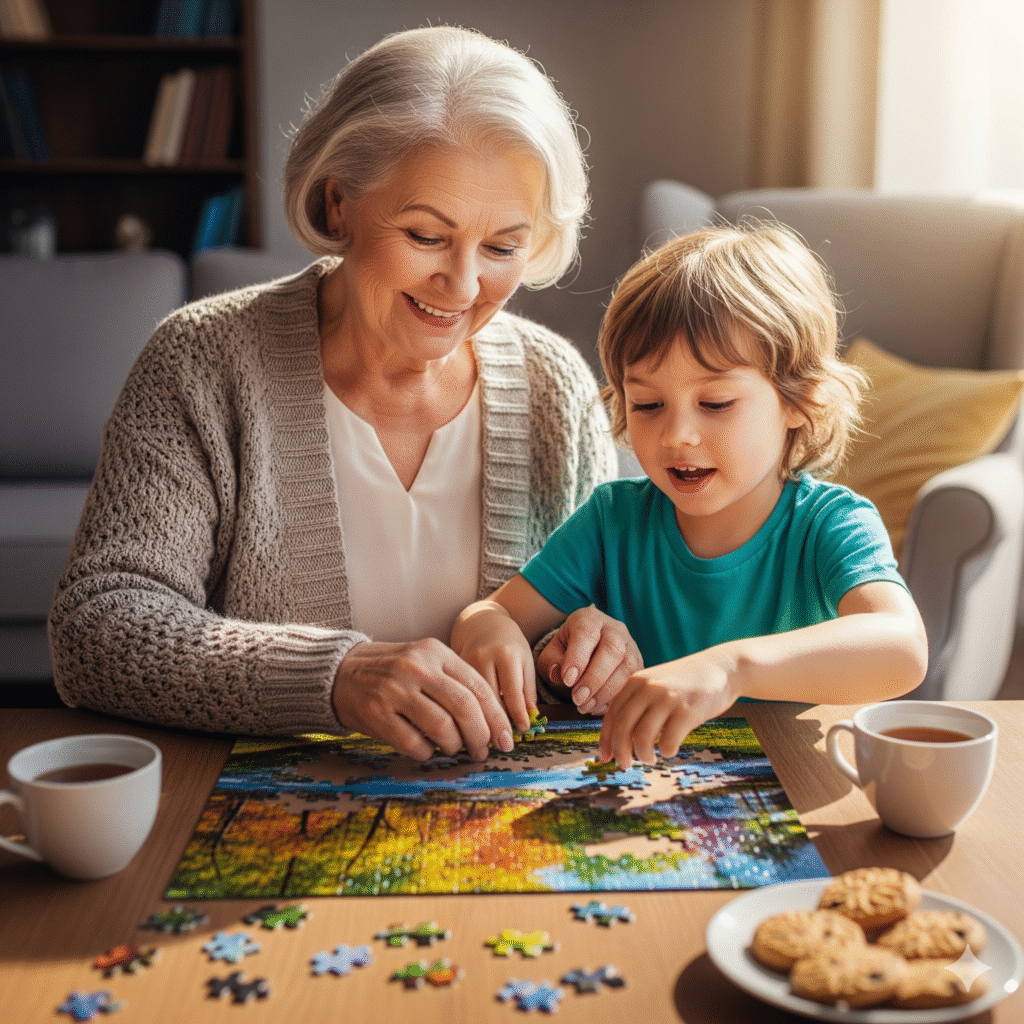
A Brief History of Jigsaw Puzzles
Puzzles have been a source of entertainment and intellectual challenge for centuries. The origins of puzzles date back to ancient civilizations, where they were designed as tools for education and enhancing cognitive skills. In the 18th century, the introduction of jigsaw puzzles marked a significant milestone in puzzling history. Crafted by cutting a map into pieces, these early jigsaw puzzles were recreational and educational, helping individuals learn geography. With advancements in printing technology, jigsaw puzzles gained popularity, and various themes emerged, catering to different interests.
High Quality Puzzles
The 20th century saw the establishment of several companies dedicated to producing high-quality puzzles for all age groups. Innovations like the rotary blade enabled more intricate designs and pieces, appealing to a wider audience. Today, the jigsaw puzzle landscape continues to flourish, with both traditional and digital variations readily available. Jigsaw puzzles not only provide mental stimulation but also serve as social activities that bring family and friends together, solidifying their status as a favored choice for indoor activities, especially among seniors.
What Is Puzzling?
Puzzling refers to the process of engaging with puzzles like jigsaw puzzles. It involves cognitive processes such as problem-solving, pattern recognition, and visual-spatial reasoning. This form of activity serves as an intellectual exercise and offers a rewarding recreational experience that can be particularly beneficial for seniors seeking stimulating indoor activities.
Enhances Fine Motor Skills
At the core of jigsaw puzzling lies the challenge of assembling individual pieces that contribute to a larger picture. Jigsaw puzzles consist of numerous interlocking pieces that must be strategically combined to form a cohesive image. The process of sorting, matching colors, and fitting shapes together not only fosters patience but also enhances fine motor skills and dexterity. Moreover, these engaging activities are effective in promoting cognitive health among seniors, as they stimulate brain function and help maintain mental acuity.
The Benefits of Jigsaw Puzzles
The benefits of engaging in jigsaw puzzles extend beyond mere entertainment. Research indicates that regular participation in puzzle-solving activities can lead to improved memory, enhanced problem-solving skills, and increased mental flexibility. For seniors, this makes jigsaw puzzles an ideal option for indoor activities. The appeal of jigsaw puzzles for seniors lies in their ability to provide a sense of accomplishment and joy, which can contribute to overall well-being. By offering various types of jigsaw puzzles suitable for different skill levels, seniors can find an enjoyable avenue for both relaxation and cognitive enhancement.
Understanding Puzzle Difficulty Levels
Jigsaw puzzles are often categorized by piece count, typically ranging from as few as 100 pieces to over 2000 pieces. For seniors seeking engaging indoor activities, starting with puzzles that have 500 pieces or less may be a good idea. These puzzles generally provide a manageable challenge while allowing individuals to complete the puzzle in a reasonable timeframe. Alternatively, those who feel more adept may enjoy tackling 1000-piece puzzles, which offer greater complexity and a longer period of engagement.
Designs Also Determine Difficulty
In addition to piece count, the design of the puzzle plays a significant role in its difficulty. Images with subtle color variations or repetitive patterns can make it harder to identify matching pieces, while vibrant, distinct images may be more approachable. It is essential to consider comfort level and preference for visual stimuli when selecting a puzzle. For instance, landscapes or colorful scenes may be more enjoyable, while abstract designs could present a greater challenge.
Creative Ways to Use Completed Puzzles
Completed jigsaw puzzles offer more than just a sense of achievement; they can also be transformed into beautiful decorations, thoughtful gifts, or meaningful community contributions. For seniors looking for creative indoor activities, there are numerous ways to repurpose these works of art.
- Frame them and display them as unique pieces of artwork in your home. By choosing a frame that matches your decor, you can enhance your living space and showcase your puzzle-solving skills.
- Gift them to family members. This thoughtful gesture shares the joy of puzzles and creates lasting memories. You can choose a family portrait or a scenic landscape to create a special bond between the giver and the recipient.
- Donate them to local organizations such as senior centers, schools, or libraries. These places often welcome puzzle donations, providing opportunities for others to enjoy the same indoor activities.
For those who enjoy crafting, completed puzzles can be disassembled into smaller pieces to create unique decorations, coasters, or greeting cards. This not only upcycles the materials but also opens up opportunities for new creative projects.
Puzzles as a Healthy Choice for Seniors
Jigsaw puzzles are an engaging and effective indoor activity for seniors, providing the dual benefit of entertainment and cognitive stimulation. Research has indicated that regular engagement with puzzles can significantly improve cognitive function and enhance memory among older adults. By challenging the brain, individuals can maintain and potentially improve their mental agility, which is crucial in combating age-related cognitive decline.
Activates Various Areas Of The Brain
Studies have suggested that activities such as solving puzzles activate various areas of the brain. This stimulation helps form new neural connections, which is essential for improving memory recall and overall cognitive functioning. The act of completing a puzzle requires concentration and focus, both of which contribute to sharpness of mind. According to research published in the Journal of the American Geriatrics Society, seniors who regularly engage in puzzle-related activities exhibit greater cognitive performance compared to those who do not.
Reduce Stress
Additionally, puzzles are known to reduce stress, an important consideration for seniors who might grapple with loneliness or anxiety. The simple act of focusing on a puzzle can be a form of mindfulness, allowing participants to immerse themselves in a task that requires both mental and physical engagement. As seniors work through challenges, they experience a sense of accomplishment upon completion, reinforcing positive feelings and enhancing their overall well-being.
Bonding with Grandchildren Through Puzzles
Jigsaw puzzles offer a unique opportunity for seniors to bond with their grandchildren, creating an enriching intergenerational experience. Engaging in puzzles for seniors can significantly enhance family connections, allowing for shared moments that transcend ages. This shared activity fosters communication and collaboration, as both generations work toward completing a common goal.
Strengthens Bonds
When grandparents and grandchildren tackle puzzles together, they engage in meaningful conversations and share stories. While fitting pieces together, a grandparent might share tales of their childhood, teaching grandchildren about family history. This exchange not only enhances the enjoyment of indoor activities but also strengthens the emotional bonds between them. The stories shared during these times create lasting memories, making puzzling a wonderful way to preserve family legacies.
Puzzles and Social Engagement: Puzzle Groups for Seniors
Jigsaw puzzles are a potent tool for social engagement among seniors. They not only entertain but also encourage interaction within local communities. Many seniors find joy in joining puzzle groups or clubs that facilitate collaboration and camaraderie while working on intricate designs together.
Forge New Friendships
Participating in a puzzle group offers multiple benefits beyond the enjoyment of solving puzzles. Social interaction is essential for seniors, as it helps combat feelings of loneliness and isolation often experienced during retirement. Through puzzle-solving sessions, seniors can forge new friendships, share life experiences, and enhance their mental well-being. The engaging nature of jigsaw puzzles stimulates cognitive skills, while the social atmosphere nurtures emotional support, making such gatherings a perfect melding of fun and functionality in senior life.
Organized Puzzle Gatherings
Local community centers, libraries, and senior centers often host organized puzzle gatherings or can provide information on existing clubs. Additionally, online platforms and social media groups can connect seniors with like-minded individuals who share a passion for puzzles.
How to Get Started with Jigsaw Puzzles
Now that you know the many benefits of puzzling, you might be ready to start. The best way to begin is by selecting a puzzle that excites you. Look for a design you love and a piece count that matches your comfort level. For a curated selection of high-quality puzzles perfect for seniors, visit my Life After 60 store. I have all kinds of designs with a variety of pieces for each design so you can choose your difficulty level.
Final Thoughts
Puzzling offers a multitude of benefits that are particularly valuable for seniors. Engaging in jigsaw puzzles has been shown to enhance cognitive functions, stimulate creativity, and provide an enjoyable means of stimulation for the mind. The act of piecing together a jigsaw puzzle can serve as an excellent mental exercise, sharpening problem-solving skills and fostering patience.
In addition to cognitive benefits, puzzles serve as a fantastic opportunity for socialization. Whether working on a challenging jigsaw puzzle with friends and family or joining a community group, this activity encourages interaction and builds relationships. These social connections can lead to enhanced emotional health, combatting feelings of isolation that sometimes accompany aging.
Puzzles also stand out as an ideal option for rainy day activities, allowing seniors to enjoy hours of fun indoors. Providing entertainment while fostering critical thinking, puzzles create a relaxed atmosphere that encourages either solitude or shared experiences, depending on personal preference.
Given the many benefits associated with puzzling, it is highly encouraged for seniors to embrace jigsaw puzzles as a daily practice. They can transform leisure time into enriching experiences that engage the mind and strengthen connections with others.
Did you enjoy this post? Do you want to know when the next post comes out? Consider subscribing. I only send update emails once a week, usually on Friday. Try it out. You can unsubscribe at any time.
